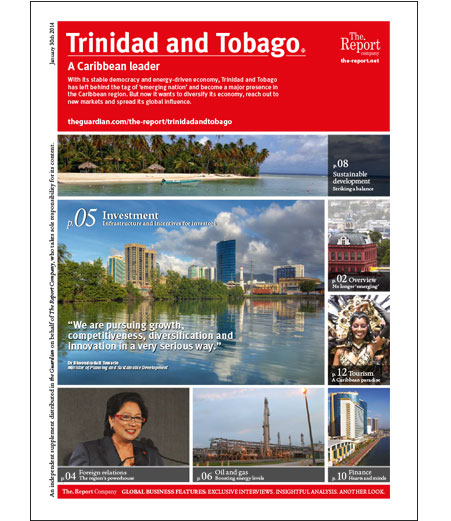Trinidad and Tobago’s financial industry is a leader in the Caribbean region, but a change of mindset could be needed to ensure further expansion.
Five years ago, Trinidad and Tobago’s financial sector was plunged into crisis. In January 2009 the Central Bank announced it was taking control of CLICO, the country’s biggest insurance firm, and CLICO Investment Bank (CIB), its largest investment lender, due to liquidity problems. It was, as current Central Bank governor Jwala Rambarran describes it, “our own Lehman meltdown”, which would cost the state upwards of US$20 billion (£12.2 billion) and shake public faith in the country’s financial institutions.
Yet half a decade on, Trinidad and Tobago’s financial industry, based on the conservative Canadian model, has recovered and weathered the broader global downturn. Eight commercial banks are operating, the same number as before the CLICO crisis and authorities say they have learned important lessons from that debacle. Regulation of the sector has been tightened up and an insurance bill, which Rambarran calls “the most substantial piece of financial legislation in the country,” has been created.
But it seems that some of the biggest challenges facing Trinidad and Tobago’s financial industry are not related to legislation, but rather to the ambitions and state of mind of its business community.
3.5%: The estimated average dividend yield on Trinidad and Tobago’s stock exchange in 2012.
Wainwright Iton, general manager of the Trinidad and Tobago Stock Exchange, says this figure dwarfs the equivalent interest being offered by commercial banks, reflecting the country’s corporate stability and attractiveness to investors.
With several large banks, a well-educated labour force and renowned telecommunications, the country is widely seen as the Caribbean’s financial hub, as well as one of its most stable economies. Its bourse, meanwhile, which was the subject of a securities reform in 2012, leads the region. Yet, as Wainwright Iton, general manager of the Trinidad and Tobago Stock Exchange, explains, local firms still need cajoling when it comes to listing on the market.
“Apart from the well-established conglomerates and big business, most of the companies are family held and fairly tightly held,” he says. “It’s difficult to convince them to give over that control.”
Iton believes his own country’s brokers are not as aggressive as their Jamaican counterparts when it comes to drumming up business.
“From my perspective, the big job is public education; convincing both the demand side and the supply side about why they should be coming to the public market to raise capital because the benefits accrue to everybody,” he explains.
Caribbean harmony
While Trinidad and Tobago’s financial sector now seems to have put behind it the trauma of CLICO, many in the industry feel the next logical step is greater integration with the rest of the Caribbean.
Securities platforms are fairly standardised across the region, but legislation is not. A single Caribbean stock exchange would create one large market and cut costs for individual nations, argues Iton. Meanwhile, in a recent meeting with fellow Caribbean central bank governors, Rambarran floated the idea of pooling foreign exchange resources to protect against the external shocks to which small island nations are so susceptible.
“[If] the EU could do it with its big, huge economies, I don’t see why 17 small islands can’t do it,” says Duane Hinkson, managing director of FirstCaribbean International Bank.
Singing the heroes’ praises
FirstCaribbean International Bank runs a pan-Caribbean programme known as Unsung Heroes, which rewards those who work to serve their community. Domestic panels select the national winners, who then enter the regional competition. In 2010, Trinidadian Stephen McClatchie won the latter award for his selfless work in the Toco community.










